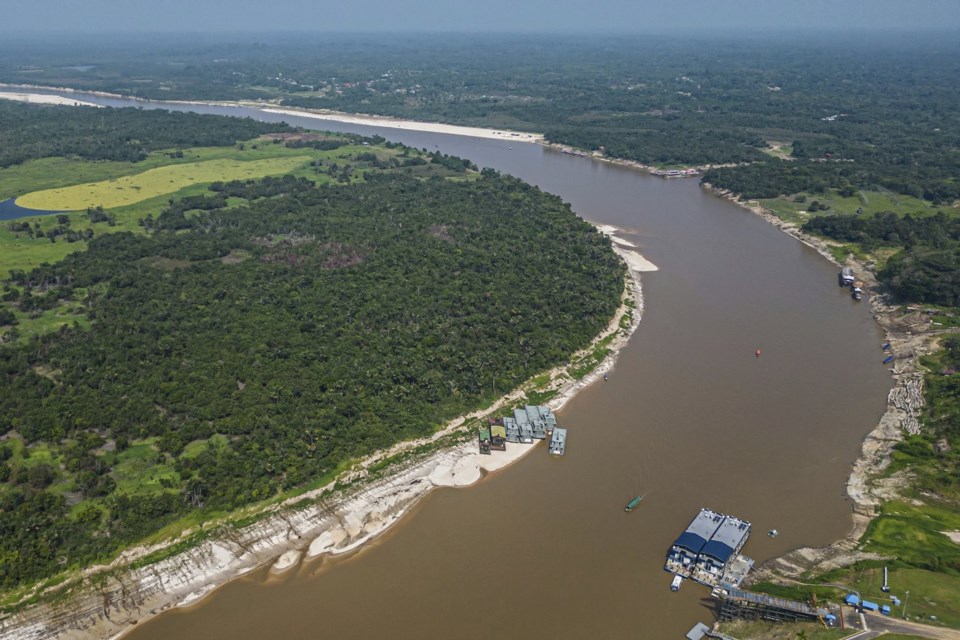BOGOTA, Colombia (AP) ŌĆö and rural communities along the Nanay River in filed a complaint on Friday accusing the government of failing to stop illegal gold mining that is contaminating their water and food with toxic mercury.
The complaint was submitted in the country's capital, Lima, to the Secretariat General of the Andean Community, a regional trade bloc that includes Peru, Ecuador, Colombia and Bolivia. The communities argue that Peru has violated a binding regional policy adopted in 2012 to combat illegal mining.
A delegation of 10 leaders and residents from the Peruvian Amazon traveled to Lima for the complaint.
ŌĆ£Peru is not fulfilling its obligations, and that has allowed illegal mining to expand, threatening the lives and rights of Amazonian communities,ŌĆØ said C├®sar Ipenza, an environmental lawyer who brought the case forward on behalf of the communities.
The Peruvian government did not immediately reply to a request for comment.
Mercury levels are too high
Mercury, widely used in gold extraction, is polluting fish ŌĆö a dietary staple ŌĆö and entering the food chain in areas surrounding the Nanay and Pintuyacu rivers.
ŌĆ£More than 80% of our population is contaminated with mercury in the blood," said Jhonny Huaymacari Yuyarima, who represents the Ikito Indigenous people and heads a local alliance of 33 communities in the Nanay basin. "The fish in our rivers and lakes are also poisoned.ŌĆØ
Huaymacari described seeing children with developmental delays, residents with chronic joint pain, skin conditions and intense headaches ŌĆö symptoms many now associate with prolonged mercury exposure.
A recent study by the Center for Amazonian Scientific Innovation, or CINCIA, and the Frankfurt Zoological Society found dangerously high levels of mercury in hair samples taken from 273 residents across six river communities in the region.
About 79% of participants had mercury levels above the World Health Organization safety limit of 2.2 milligrams per kilogram.
Children up to age 4 had the highest average levels ŌĆö nearly six times the recommended limit. Fish from the same area had elevated mercury concentrations, particularly in carnivorous species that are commonly eaten.
ŌĆśWidespread exposureŌĆÖ
ŌĆ£These are not isolated cases. This is widespread exposure,ŌĆØ Ipenza said. ŌĆ£And weŌĆÖre talking about people who depend on fish as their primary protein source, and on the Nanay River for drinking water ŌĆö including the city of Iquitos.ŌĆØ
Huaymacari says it hurts to think that after more than 20 years of fighting illegal mining, "the state still doesnŌĆÖt listen to us.ŌĆØ
ŌĆ£The mercury is in our bodies now. WeŌĆÖll have to live with this if the Peruvian state does nothing," he told The Associated Press, citing the example of PeruŌĆÖs southern region of Madre de Dios, long plagued by illegal mining.
Researchers and environmental groups now warn that the sprawling expanse of Loreto ŌĆö where Iquitos is the regional capital and the home of the Nanay ŌĆö is becoming the new frontier.
A 2023 report by the Monitoring of the Andean Amazon Project showed growing deforestation and mining activity creeping into Nanay headwaters, even in protected areas.
The CINCIA study, one of the first to systematically assess mercury exposure in Loreto communities, found that while most fish samples did not exceed international safety limits, the amount and frequency of fish consumption meant even moderate levels of contamination are a serious risk.
Loreto has the highest per capita fish consumption in Peru, with some families along the river eating fish two to three times daily.
Beyond the toxic exposure, communities are also reporting serious social and security impacts, including the arrival of armed groups, illegal labor, and sexual exploitation at mining camps. Local leaders say environmental defenders have been threatened and communal governance structures weakened.
ŌĆ£Almost 80% of the people there are foreigners, and more than 60 (gold mining) dredges are operating in the area," said Huaymacari of the Ikito.
In one of their communities, a Colombian flag was raised, he said. ŌĆØIt no longer feels like Peru.ŌĆØ
A call to action
Local police and navy posts lack the staff, equipment, and logistical support to confront the spread of illegal mining, Huaymacari said.
"TheyŌĆÖre trying, but they donŌĆÖt have the tools to fight this plague of illegal mining,ŌĆØ he said.
The Andean Policy to Fight Illegal Mining obliges member states to coordinate regionally and curb organized criminal activities linked to illegal extraction. The complaint asks the regional body to formally declare Peru in violation and issue corrective recommendations.
While the Andean Community cannot impose sanctions, its rulings are binding under regional law, and a formal declaration could pressure Peru to adopt corrective measures or face reputational and diplomatic consequences.
Ipenza said it isn't just about Peru and that wider ŌĆ£action needs to be taken."
ŌĆ£Mercury pollution and illegal gold cross borders ŌĆö and the damage is not just environmental. ItŌĆÖs deeply human,ŌĆØ he said.
The communities behind the complaint say they are not seeking financial compensation, but urgent recognition of their rights, protection of their territories, and accountability from a state that, they say, has abandoned them.
The Andean Community has yet to comment on the case, which could set a regional precedent for holding governments accountable for cross-border environmental harms.
ŌĆ£We, the 33 communities of this basin, are prepared to raise our voices together and say: enough is enough!" said Huaymacari. ŌĆ£We call on the government to act urgently."
___
The Associated PressŌĆÖ climate and environmental coverage receives financial support from multiple private foundations. AP is solely responsible for all content. Find APŌĆÖs for working with philanthropies, a list of supporters and funded coverage areas at .
Steven Grattan, The Associated Press



